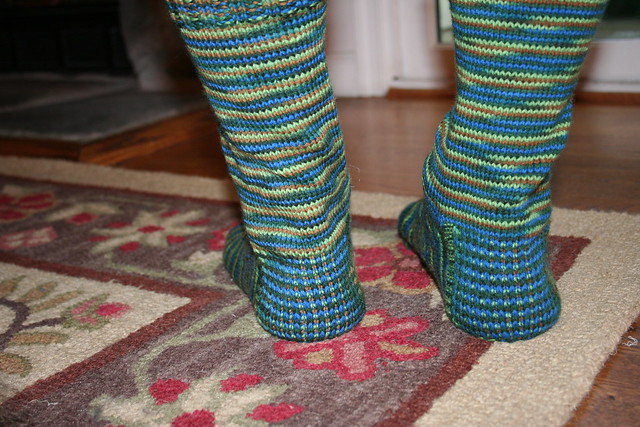Words for heel and related words in Celtic languages.
| Proto-Celtic | *stātlā / *stādlā = heel |
|---|---|
| Old Irish (Goídelc) | sál [saːl] = heel |
| Irish (Gaeilge) | sáil [sˠɑːlʲ/sˠæːlʲ] = heel sáilchaite = down at heel sála arda = high heels |
| Scottish Gaelic (Gàidhlig) | sàil [saːl] = heel, boot, trunk (of car) sàileach [saːləx] = heel-like, having heels, heeled sàil bhiorach = high heel gu mo shàil = (come to) heel! (dog command) |
| Manx (Gaelg) | saayl = heel, tree, tip, sale, skid saayltrey = to heel in, trampling, treading saayltraghey = to tread on with heel saayl-cheaut = down at heel |
| Middle Welsh (Kymraec) | saudel = heel oet = time, period |
| Welsh (Cymraeg) | sawdl [sau̯dl/ˈsau̯dʊl] = heel soldlaf, sodli, sodlu, sodlo = to heel (a shoe or sock), trip (sb) up, take to one’s heels, run (away), go sodliad = a kick with the heel, tripping sodlog = (high-)heeled sodlwr, sawdlwr = heeler (of shoes), shadower, one who follows at the heels sodlau uchel = high heels disodli = to displace, supplant |
| Cornish (Kernewek) | seudhel [ˈsœðɛl / ˈzɛðɐl] = heel seudhelyow ughel = high heels |
| Middle Breton (Brezonec) | seuzl = heel |
| Breton (Brezhoneg) | seul = heel seulad = substrate seulañ = to heel seulenn = heel pad seuler = hooker seul an dorn = heel of the hand seul pik = stiletto heel seulioù uhel = high heels |
Etymology: from the Proto-Indo-European *stéh₂tleh₂ / *stéh₂dʰleh₂ (that which is used for standing), from *steh₂- (to stand) [source].
| Proto-Celtic | *bundos = foot, hoof, sole |
|---|---|
| Old Irish (Goídelc) | bonn = foot, hoof, sole |
| Middle Irish (Gaoidhealg) | bonn = sole of the foot, foot, hoof |
| Irish (Gaeilge) | bonn [bˠoun̪ˠ/bˠuːn̪ˠ/bˠʌn̪ˠ] = sole (of foot), footing, foothold, base, foundation, footmark, spoor, tyre, backing bonnaigh = to walk, trot bonnaire = walker, trotter, footman, foot messenger bonnaireacht = walking, trotting |
| Scottish Gaelic (Gàidhlig) | bonn [bɔun̪ˠ] = base, bottom, foundation, lowest, part, sole (of a shore), foot (of a hill) bonntachadh [bɔun̪ˠdəxəɣ] = (act of) basing, establishing, consolidating, base, foundation, farmstead, homestead bonntaichte [bɔun̪ˠdɪçdʲə] = based, established, consolidated |
| Manx (Gaelg) | boyn = heel, walker, foot of sail, tread of shoe, basement, medal |
Etymology: from the Proto-Indo-European *bʰudʰmḗn (bottom), from *dʰewbʰ-/*dʰubʰ- (deep) [source].
Words from the same PIE roots include fund in English; fondo (bottom, fund, background); and fond (back, bottom, fund, foundation) in French [source].
Sources: Wiktionary, Am Faclair Beag, Online Manx Dictionary, Teanglann.ie, eDIL – Electronic Dictionary of the Irish Language, In Dúil Bélrai English – Old Irish glossary, Geiriadur Prifysgol Cymru, Gerlyver Kernewek, Dictionaire Favereau, TermOfis, English – ProtoCeltic WordList (PDF), Etymological Dictionary Of Proto Celtic


The more usual word for ‘heel’ in Manx/Gaelg is boyn, cognate with bonn in Irish/Gaeilge. I see that the latter means ‘sole’, ‘foothold’, or ‘base’, also ‘medal’ or ‘coin’.